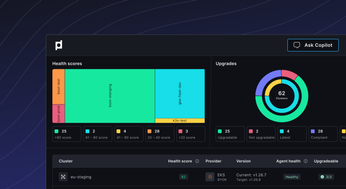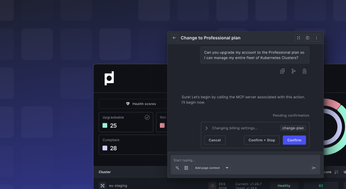
Kubernetes for FinServ: Solving Modern Challenges
Learn how Plural simplifies Kubernetes for FinServ, enhancing security, compliance, and scalability across cloud and on-prem environments.
Financial service institutions face constant pressure to deliver new services rapidly and at scale. At the same time, financial services is a highly regulated industry, requiring higher levels of access security controls, enforced isolation boundaries, and auditing of all Kubectl actions due to PCI regulatory requirements.
Fintech companies have aggressive cloud infrastructure goals with strict deadlines, and the overhead of maintaining Kubernetes fleets adds up when you scale. For starters, finding talented Kubernetes engineers is difficult and quite costly, and smaller DevOps teams are devoting high levels of attention to managing Kubernetes details vs. focusing on higher-value work.
It is also quite difficult and time-consuming to upgrade Kubernetes versions since you don’t know which compatibility problems will arise until they pop up. Ultimately, it slows down the pace you can release software and cuts into your bottom line.
And, to top it all off, gaining a single, unified view of all your applications and clusters spanning across various cloud providers, on-prem, and edge environments increases in complexity as you scale upwards.
As organizations expand their Kubernetes cluster presence, establishing a standardized approach to Kubernetes management across different teams is necessary. This means adopting a robust Kubernetes fleet management platform, especially as stringent industry regulations come into play.
Financial services demands both rapid innovation and rock-solid security. Kubernetes is key for modernizing apps and infrastructure, but its complexity can be a real challenge for smaller DevOps teams, especially in FinServ. Manually managing Kubernetes clusters is time-consuming and error-prone. This article explores those challenges—from regulatory compliance to high availability—and shows how Plural streamlines Kubernetes for FinServ, freeing your team to build and deploy secure, scalable applications. Learn more about Kubernetes fleet management with Plural.
Kubernetes and FinServ: How Plural Solves Engineering Challenges
After talking with hundreds of engineering leaders in the financial services industry, we can break down the problems engineering teams face into five parts.
Key Takeaways
- Kubernetes is transforming financial services infrastructure: From enhanced security and high availability to faster development cycles, Kubernetes empowers financial institutions to modernize their technology stack and meet evolving market demands.
- Managing Kubernetes at scale requires a robust platform: The operational complexity of Kubernetes necessitates a comprehensive management solution. Plural simplifies Kubernetes fleet management, automating key tasks and reducing the burden on specialized engineering teams.
- Plural empowers financial institutions to embrace Kubernetes: Plural's centralized platform streamlines Kubernetes operations, enhances security and compliance, and provides the scalability needed to support future growth in the financial services sector.
Why Kubernetes is Transforming Financial Services
Kubernetes has emerged as a game-changer in the financial services industry, offering a powerful platform for modernizing infrastructure and applications. Its benefits span various critical areas, from enhancing security and ensuring high availability to enabling faster development cycles and optimizing costs. Let's explore how Kubernetes is reshaping the financial landscape.
Enhanced Security and Compliance
Meeting Regulatory Requirements with Kubernetes
Security and compliance are paramount in financial services. Kubernetes provides robust security features, such as Role-Based Access Control (RBAC) and network policies, that help firms meet stringent regulatory standards like PCI DSS. RBAC allows granular control over access to Kubernetes resources, while network policies enable defining rules for communication between pods and services, enhancing network security and data protection. This granular control and enhanced security are crucial for protecting sensitive financial data and maintaining customer trust.
High Availability and Disaster Recovery
Minimizing Downtime with Advanced Monitoring
Downtime is incredibly costly in the financial industry. Kubernetes, combined with monitoring tools like Prometheus and Grafana, ensures high availability and facilitates disaster recovery. Using Kubernetes with these monitoring tools allows proactive identification of potential issues and faster incident response, minimizing downtime and ensuring continuous service uptime, as highlighted by Rajesh Gheware in his LinkedIn article.
Scalability and Adaptability to Market Demands
Dynamic Scaling with Kubernetes
Financial markets are dynamic, and institutions need to adapt quickly to changing conditions. Kubernetes offers features like the Horizontal Pod Autoscaler, Cluster Autoscaler, and AWS Karpenter that enable dynamic scaling of applications. As noted by Rajesh Gheware, these tools automatically adjust the number of pods or nodes based on real-time demand, ensuring optimal resource utilization and responsiveness to market fluctuations. This scalability is essential for handling peak loads and maintaining performance during periods of high activity.
Faster Time to Market with Streamlined Development
Integrating Kubernetes with CI/CD Pipelines
Speed and agility are crucial for staying competitive in the financial services landscape. Kubernetes integrates seamlessly with CI/CD pipelines, fostering a DevOps culture and accelerating the development and release of new financial products and services. According to Gheware's insights, integrating Kubernetes with CI/CD pipelines speeds up development and releases, giving financial institutions a competitive edge.
Data-Driven Insights with Efficient Logging and Analytics
Leveraging Logging and Analytics Tools in Kubernetes
Data is the lifeblood of financial institutions. Kubernetes, when used with tools like FluentD and the ELK stack (Elasticsearch, Logstash, Kibana), provides comprehensive logging and analytics capabilities. These tools, as mentioned by Rajesh Gheware, offer valuable insights for compliance reporting, operational improvements, and better decision-making.
Cost Optimization and Resource Efficiency
Optimizing Resource Use with Kubernetes
Efficient resource utilization is key to controlling costs. Kubernetes optimizes resource allocation, leading to lower operational costs without compromising performance or service quality. Rajesh Gheware highlights how Kubernetes optimizes resource use, leading to cost savings.
Immutability, Declarative Configuration, and Self-Healing
Ensuring Stability and Simplifying Operations
Kubernetes embraces immutability and declarative configuration, simplifying operations and enhancing stability. Its self-healing capabilities automatically detect and recover from failures, ensuring uninterrupted service and reducing manual intervention. FPT Software points out how Kubernetes automatically recovers from issues, ensuring service continuity.
Industry Trends and the Rise of Kubernetes in Finance
Widespread Adoption of Kubernetes
The adoption of Kubernetes in financial services is rapidly increasing. Reports indicate a significant majority of organizations are now using or evaluating Kubernetes. This widespread adoption reflects the growing recognition of Kubernetes as a key enabler of digital transformation in the financial industry.
The Impact of Mobile Banking on Infrastructure Needs
The rise of mobile banking has placed unprecedented demands on financial institutions' infrastructure. Customers expect 24/7 access to services, and mobile apps generate massive amounts of data. Kubernetes provides the scalability, resilience, and agility needed to meet these demands, enabling financial institutions to deliver seamless mobile banking experiences.
Addressing the Challenges of Kubernetes Adoption
Managing the Complexity and Costs of Kubernetes
Exploring Alternative Solutions like Cloud Run
While Kubernetes offers numerous benefits, managing its complexity and costs can be challenging. Solutions like Google Cloud Run provide a serverless platform for running containers, abstracting away much of the underlying infrastructure management. Ben Houston discusses his experience with alternative solutions in his blog post. For certain use cases, serverless platforms can be a simpler and more cost-effective alternative to managing Kubernetes directly. However, for organizations requiring fine-grained control and customization, Kubernetes remains the preferred choice. Plural can help manage this complexity and offers solutions for various needs.
Mitigating Vendor Lock-in Concerns
One concern with adopting Kubernetes is the potential for vendor lock-in. Choosing a platform-agnostic solution and leveraging open-source tools can help mitigate this risk. Plural, for example, supports multi-cloud deployments and integrates with various open-source technologies, giving organizations greater flexibility and control over their Kubernetes environment. Contact us to learn more.
Real-World Use Cases of Kubernetes in Financial Services
Powering Core Banking Applications with Kubernetes
Synechron highlights how major banks globally are using Kubernetes to modernize their core banking applications. By migrating these critical systems to Kubernetes, banks can improve scalability, resilience, and agility, enabling them to respond more effectively to changing customer demands.
Enhancing Fraud Detection and Risk Management
Kubernetes plays a crucial role in enhancing fraud detection and risk management systems. Its ability to process large volumes of data in real-time enables financial institutions to identify and respond to fraudulent activities more quickly and effectively.
Creating Personalized Customer Experiences
Kubernetes enables financial institutions to deliver personalized customer experiences through its support for microservices and data-driven applications. By leveraging Kubernetes, banks can create customized offers and services tailored to individual customer needs.
Managing Regulatory Compliance with Kubernetes
Kubernetes helps financial institutions manage regulatory compliance by providing a secure and auditable platform for running applications. Its robust security features and logging capabilities simplify compliance reporting and ensure adherence to industry regulations.
Transforming Banking and Finance with Linux and Kubernetes
The combination of Linux and Kubernetes is transforming the banking and finance industry. Linux provides a stable and secure foundation, while Kubernetes offers the orchestration capabilities needed to manage complex, distributed applications. Together, they empower financial institutions to build modern, cloud-native systems that are scalable, resilient, and cost-effective.
Kubernetes Fundamentals for Financial Institutions
Understanding the Origins and Meaning of Kubernetes
Kubernetes originated from Google's experience managing containers at scale. Its name, derived from the Greek word for "helmsman" or "pilot," reflects its role in orchestrating containerized applications. Understanding Kubernetes's origins helps appreciate its design principles and capabilities.
Kubernetes as the Standard for Cloud-Native Applications
Kubernetes has become the de facto standard for deploying and managing cloud-native applications. Its ability to automate deployments, scale applications dynamically, and manage complex distributed systems makes it an essential tool for financial institutions embracing cloud-native architectures.
Managing Your Kubernetes Fleet with Plural
Building and maintaining scalable and reliable infrastructure shouldn’t slow down innovation. Application team's priorities shouldn’t be focused on setting up and maintaining their environments. Instead, they should be focusing on building applications and meeting the growing needs of their customers.
Currently, the barrier to entry to working with Kubernetes is high and slows down fast-moving teams' adoption of Kubernetes at scale. Plural allows any engineer to easily manage their Kubernetes ecosystem anywhere - securely and at scale - in a single pane of glass regardless of expertise.
Plural is a self-hosted Kubernetes fleet management platform that provides a single pane of glass, removing the complexity of managing Kubernetes clusters at scale. With Plural, engineering teams can gain visibility, automation, governance, and security capabilities in an easily adaptable platform to manage the lifecycle of Kubernetes clusters across public clouds such as AWS, Azure, and GCP as well as on-prem and remote/edge locations.
With Plural, engineering teams can do the following:
- Plural will give your engineering organization multi-cluster visibility into your entire cluster fleet across various environments. With Plural, your engineers get self-service access to Kubernetes clusters and automated cluster lifecycle management using proven templates with guardrails included.
- Manage Kubernetes clusters and add-on upgrades in a single, intuitive interface and confidently know that upgrading a Kubernetes version won’t break anything downstream. Plural will help you with upgrading the control plane, Kubernetes add-ons, and your services. With Plural, you’ll be made aware if you have a compatible version of your add-ons for the version of Kubernetes you are upgrading.
- Share the responsibility of managing Kubernetes tasks with a broader subset of your engineers, including those without prior Kubernetes experience. Top-tier Kubernetes talent is costly and hard to attain. Managing infrastructure shouldn’t be challenging and pricey, and your most skilled engineers should focus on building out awesome product features to drive business value. With Plural, your team can create standard workflows to automate time-tedious and challenging tasks of configuring, and provisioning clusters across fleets in one patch rather than following the manual, error-prone process today that makes managing Kubernetes clusters challenging.
To learn more about Plural’s self-hosted fleet Kubernetes fleet management platform sign up for a custom product demo to learn more.
Plural: Simplifying Kubernetes Fleet Management for Financial Services
Financial institutions face unique challenges when managing Kubernetes. You need a platform that simplifies operations while addressing stringent security and compliance requirements. Plural is designed to do just that.
Streamlining Operations with Plural's Centralized Platform
Managing multiple Kubernetes clusters across different environments quickly becomes complex. Manually provisioning, configuring, and upgrading these clusters is time-consuming and error-prone. Plural provides a centralized platform to streamline these operations. We automate the provisioning and lifecycle management of every Kubernetes cluster—whether it's in the cloud (AWS, Azure, GCP), on-premises, or at the edge. This standardization across your fleet, powered by Plural's fleet management capabilities, ensures consistency and reduces operational overhead. With Plural, your team can focus on delivering value, not wrestling with infrastructure.
Enhanced Security and Compliance with Plural
Security and compliance are paramount in financial services. Plural helps you meet these demands by creating governance standardizations across all teams using Kubernetes. We provide self-service access with built-in guardrails, ensuring developers have the resources they need while adhering to strict security policies. This balance of agility and control is crucial for managing Kubernetes in regulated environments. Plural's robust access control mechanisms and audit trails help you maintain a secure and compliant posture.
Scalability and Flexibility for Growing Financial Institutions
As your financial institution grows, your infrastructure needs to scale seamlessly. Plural enables faster time-to-value by providing instant access to production-ready infrastructure. Our platform guarantees consistent and reliable Kubernetes operations, regardless of scale. This flexibility allows you to adapt to changing market demands and support rapid growth without compromising stability or performance. Learn more about how Plural can help you scale your Kubernetes operations.
Related Articles
- Managing Kubernetes Deployments: A Comprehensive Guide
- Top tips for Kubernetes security and compliance
- What is a Kubernetes Cluster? Your Complete Guide
- Kubernetes Terminology: A 2023 Guide
Frequently Asked Questions
How does Plural handle upgrades for Kubernetes and its add-ons?
Plural simplifies Kubernetes and add-on upgrades by providing a unified interface and performing pre-upgrade compatibility checks. This ensures a smooth upgrade process and minimizes the risk of downstream issues. Plural also scans for deprecated APIs to help you maintain a modern and efficient Kubernetes environment.
What if my team lacks extensive Kubernetes expertise?
Plural is designed to be accessible to engineers with varying levels of Kubernetes experience. Its intuitive interface and automated workflows simplify complex tasks, enabling a broader range of engineers to manage Kubernetes deployments and freeing up senior engineers to focus on higher-value projects.
How does Plural address security and compliance in regulated environments like financial services?
Plural provides robust security features, including granular access controls and comprehensive audit trails. This helps financial institutions meet stringent regulatory requirements while enabling self-service access for developers with appropriate guardrails.
Can Plural manage Kubernetes clusters across different environments?
Yes, Plural supports multi-cloud and hybrid deployments, allowing you to manage Kubernetes clusters across various public clouds (AWS, Azure, GCP), on-premises infrastructure, and edge locations, all from a single pane of glass.
What are the key benefits of using Plural for Kubernetes fleet management?
Plural streamlines Kubernetes operations, enhances security and compliance, improves scalability, and reduces the complexity of managing multiple clusters. This leads to faster time-to-value, increased efficiency, and cost optimization for organizations leveraging Kubernetes.
Newsletter
Join the newsletter to receive the latest updates in your inbox.







